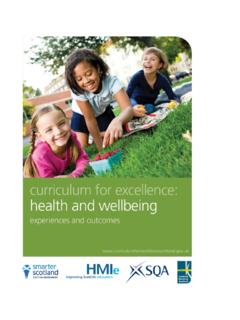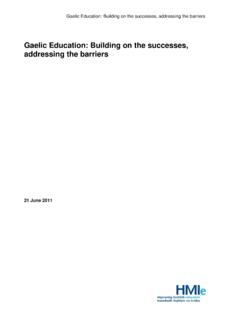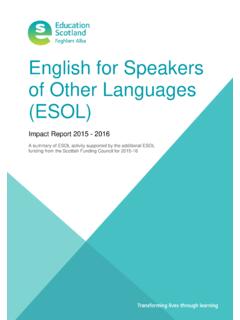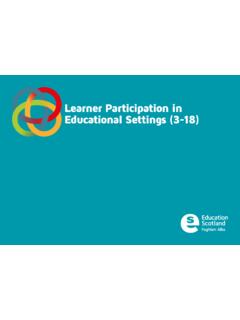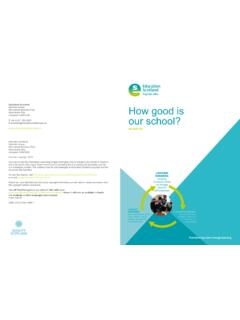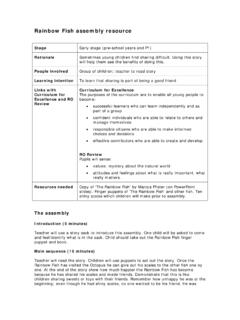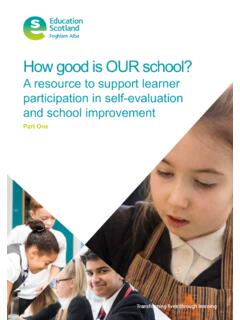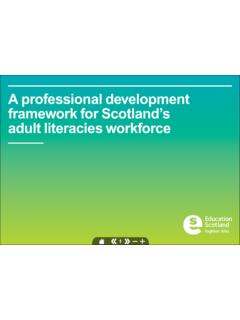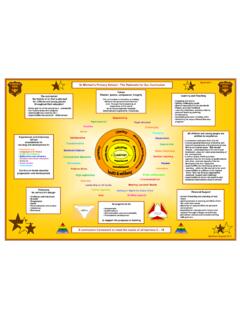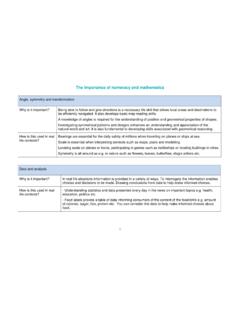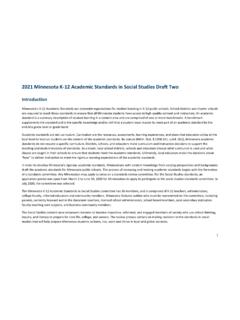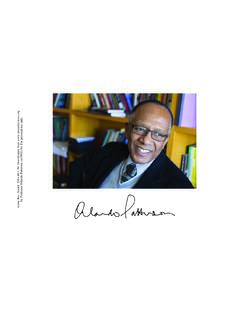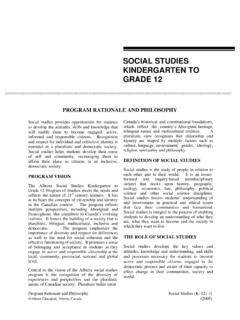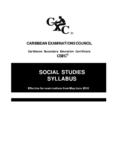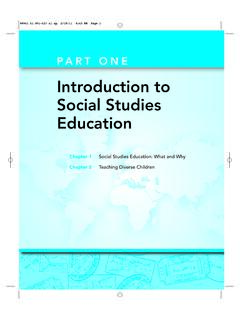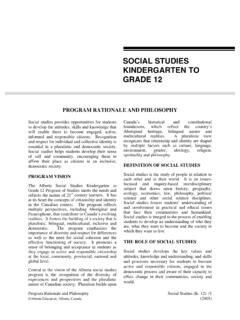Transcription of Social studies: Principles and practice
1 Social studies : Principles and practice 1 Social studies Principles and practice What will learning in Social studies enable children and young people to do? Through Social studies , children and young people develop their understanding of the world by learning about other people and their values, in different times, places and circumstances; they also develop their understanding of their environment and of how it has been shaped. As they mature, children and young people s experiences will be broadened using Scottish, British, European and wider contexts for learning, while maintaining a focus on the historical, Social , geographic, economic and political changes that have shaped Scotland. Children and young people learn about human achievements and about how to make sense of changes in society, of conflicts and of environmental issues. With greater understanding comes the opportunity and ability to influence events by exercising informed and responsible citizenship.
2 Children and young people as they participate in experiences and outcomes in Social studies will: develop their understanding of the history, heritage and culture of Scotland, and an appreciation of their local and national heritage within the world broaden their understanding of the world by learning about human activities and achievements in the past and present develop their understanding of their own values, beliefs and cultures and those of others develop an understanding of the Principles of democracy and citizenship through experience of critical and independent thinking explore and evaluate different types of sources and evidence learn how to locate, explore and link periods, people and events in time and place learn how to locate, explore and link features and places locally and further afield engage in activities which encourage enterprising attitudes develop an understanding of concepts that encourage enterprise and influence business establish firm foundations for lifelong learning and for further specialised study and careers.
3 How are the Social studies experiences and outcomes organised? The Social studies experiences and outcomes have been structured under the three main organisers: people, past events and societies people, place and environment people in society, economy and business. These organisers recognise the special contribution made by each of the Social subjects, whilst enabling them to reflect local contexts. Teachers will use this framework to provide children and young people with opportunities for effective interdisciplinary working by making connections across and between subject boundaries. Teachers should not feel constrained by the organisers and should explore the opportunities to plan within and across curriculum areas as outlined below to enhance learning. The organisers will assist with the collaborative planning of coherent programmes of learning within and between establishments.
4 The fourth level provides a range of experiences and outcomes within which there can be choice and scope for depth, challenge, enjoyment and personalisation. Schools and their partners will consider how they can offer and plan different combinations of the experiences and outcomes to provide a sound basis for more advanced study. The level of achievement at the fourth level has been designed to approximate to that associated with SCQF level 4. Social studies : Principles and practice 2 What learning and teaching approaches can I use in Social studies ? Although the content of the curriculum is important, our aspirations can only be achieved through high quality learning and teaching. The Social studies experiences and outcomes will support staff in planning challenging, engaging and enjoyable learning and teaching activities which will stimulate the interest and motivation of children and young people.
5 They allow flexibility and choice for both teachers and learners which can sustain interest and enthusiasm. In Social studies , effective learning and teaching will draw upon a variety of approaches including: active learning which provides opportunities to observe, explore, experiment and play use of relevant contexts and experiences familiar to children and young people appropriate and effective use of technology building on the Principles of Assessment is for Learning both collaborative and independent learning discussion and informed debate interdisciplinary learning experiences learning outdoors, field trips, visits and input by external contributors. How are skills developed in Social studies ? The development of skills is an essential aspect of learning in Social studies and the experiences and outcomes provide frequent opportunities for applying these skills in new and more complex contexts.
6 Terms such as investigating , exploring , discussing and presenting are used throughout the experiences and outcomes from early to fourth level, recognising that at all stages learners are capable of exercising these skills at a level appropriate to their development. The framework ensures that Social studies provide an important context for the development of literacy and numeracy skills. Children and young people as they learn within the Social studies will develop a range of skills including: observing, describing and recording comparing and contrasting to draw valid conclusions exploring and evaluating different types of sources and evidence development of curiosity and problem solving skills and capacity to take initiatives interacting with others and developing an awareness of self and others planning and reviewing investigation strategies developing the capacity for critical thinking through accessing, analysing and using information from a wide variety of sources discussion and informed debate developing reasoned and justified points of view developing and using maps in a variety of contexts developing and applying skills in interpreting and displaying graphical representation of information developing an awareness of sequence and chronology presentation skills oral, written, multimedia.
7 Teachers will support children and young people as they progressively develop these skills by applying them in new and more complex contexts. Skills are to be regarded as a continuum and should not be capped at any particular level. The professional judgement of teachers is essential in ensuring that individual learners are faced with the appropriate level of challenge in developing skills. What are broad features of assessment in Social studies ? Assessment in Social studies will focus on children and young people s knowledge, understanding and skills in their studies of people, past events, society, place, environment, economy and business. Teachers can gather evidence as part of day-to-day learning, as children and young people describe and record, explore and analyse sources, interpret and display information, talk and debate with peers and adults, undertake investigations and present their thinking orally, in writing or in a multimedia format.
8 Specific assessment tasks will be valuable in assessing progress. From the early years through to the senior stages, Social studies : Principles and practice 3 children and young people can demonstrate their progress through their skills in using differing sources of evidence, in assessing its validity and reliability, and in applying these in everyday life and work. This will include assessment of how well children and young people can use their knowledge and understanding to interpret evidence and present an informed view, progressing to being able to sustain a line of argument. Learners can also demonstrate evidence of progress through their abilities in applying their knowledge and skills in increasingly demanding and/or unfamiliar contexts, such as environmental issues, citizenship, and their awareness of the world and Scotland s place in it. Approaches to assessment should identify the extent to which children and young people can apply these skills in their learning and their daily lives and in preparing for the world of work.
9 For example: Do they show awareness of the importance of participating in decision-making processes? How well are they prepared to contribute to discussions on local, national and global issues? Children and young people can demonstrate progression in knowledge, understanding and skills by how well they deal with increasingly demanding and challenging concepts within a wide range of economic, geographical, historical, political and Social contexts. Progress can be seen in their: growing abilities to understand the complexity of such issues with increasing maturity and empathy increasingly sophisticated views skills in supporting these by reference to carefully-considered evidence and sources abilities to draw together their learning to demonstrate the depth of their understanding, for example of Scotland s history. Assessment should also link with other areas of the curriculum, within and outside the classroom, offering children and young people opportunities to develop awareness of Social issues such as sustainability and enterprise through field trips, visits to local and national heritage sites, and meetings with members of the community.
10 What connections are there between Social studies and other areas of the curriculum? Social studies experiences and outcomes encourage links with other areas of learning to provide learners with a deeper, more enjoyable and active experience. The promotion of active citizenship is a central feature of learning in Social studies as children and young people develop skills and knowledge to enable and encourage participation. Within Social studies , practitioners will plan opportunities for children and young people to become involved in their local community and the wider world to support them in considering and developing their roles as active and informed citizens. All staff teaching Social studies will identify opportunities to develop and reinforce Social studies knowledge and skills both, within their own teaching activities and through working with their colleagues to plan interdisciplinary studies and a coherent approach to the development of literacy, numeracy, citizenship, creativity, enterprise and sustainability.
